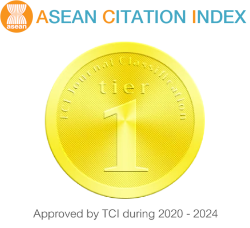Feasibility Study of Newborn Screening for Inborn Errors of Metabolism by Tandem Mass Spectrometry
Keywords:
expanded new-born screening, inherited rare disease, small molecule metabolic disease, tandem mass spectrometryAbstract
This study aimed to investigate the feasibility of the inclusion of the expanded newborn screening for inborn errors of metabolism using tandem mass spectrometry (TMS or MS/MS) in the benefit package of Thailand’s universal coverage scheme (UCS). A mixed-method approach was employed, including survey data, and in-depth interviews. The study participants were healthcare providers who were involved in providing screening and care for the patients in six healthcare facilities and 15 medical personnel and scientists. Descriptive statistics and content analysis were used to analyze quantitative and qualitative data respectively. The study found that in 2021, there were two MS/MS equipment providing services for up to about 60,000 cases per year, while 14 MS/MS were needed to cover all newborn populations in the country within 2026. Therefore, it is necessary to install 12 more MS/MS equipment. It was also found that the rare disease centers or healthcare facilities that could provide screening, diagnosis, and treatments were not evenly available in all regions of Thailand. The facilities were concentrated in Bangkok areas and the number of service personnel was small. In the future, the national neonatal screening center and relevant sectors should develop a comprehensive plan to facilitate, supervise, and monitor the installation, technology transfer, and expansion of the MS/MS technology to cover the whole country.
References
Wasan P. Pediatrics: children’s metabolic genetics. Bangkok: Division of Medical Genetics Pediatrics, Faculty of Medicine Siriraj Hospital; 2003.
Vatanavicharn N, Ratanarak P, Liammongkolkul S, Sathienkijkanchai A, Wasant P. Amino acid disorders detected by quantitative amino acid HPLC analysis in Thailand: an eightyear experience. Clinical Chimica Acta; International Journal of Clinical Chemistry. 2012;413(13-14):1141-4.
Birth Defects Association (Thailand), Medical Genetics and Genomics Association, The Royal College of Pediatricians of Thailand. (Draft) Clinical practice guidelines for genetic and metabolic diseases expanded newborn screening by tandem mass spectrometry. 2024 [cited 2024 May 1]. Available from: https://drive.google.com/file/d/1VXLL1aRqAcErYjI3WmT-2vEFnAZXYUeQ9/view. (in Thai)
Vatanavicharn N, Liammongkolkul S. Proposal to develop benefits package for expanded newborn screening and inborn errors of metabolism for universal coverage benefits package (UCBP). Documents for a brainstorming meeting to set priorities from the network group and civil society in the national health insurance system, 2019 Dec 20, Bangkok. (in Thai)
Armstrong MD, Shaw KN, Robinson KS. Studies on phenylketonuria. II. The excretion of o-hydroxyphenylacetic acid in phenylketonuria. The Journal of Biological Chemistry. 1955;213(2):797-804.
Guthrie R, Susi A. A simple phenylalanine method for detecting phenylketonuria in large populations of newborn infants. Pediatrics. 1963;32:338-43.
McCabe L, Kuhlman K, McCabe ERB. Reliability of the guthrie bacterial inhibition assay (BIA) for phenylalanine. Pediatr Res. 1985;19(4):316.
Ceglarek U, Leichtle A, Brügel M, Kortz L, Brauer R, Bresler K, et al. Challenges and developments in tandem mass spectrometry based clinical metabolomics. Molecular and Cellular Endocrinology. 2009;301(1):266-71.
Yoon H-R. Screening newborns for metabolic disorders based on targeted metabolomics using tandem mass spectrometry. Ann Pediatr Endocrinol Metab. 2015;20(3):119-24.
Mak CM, Lee H-CH, Chan AY-W, Lam C-W. Inborn errors of metabolism and expanded newborn screening: review and update. Critical Reviews in Clinical Laboratory Sciences. 2013;50(6):142-62.
Department of Medical Sciences, Ministry of Public Health. Newborn screening laboratory guideline. Nonthaburi: Ministry of Public Health; 2022. (in Thai)
National Health Security Office. 4.4 universal coverage benefits package (UCBP) as it relates to the National Health Insurance System in 2021: benefits package for rare diseases process development. Paper presented at: The Subcommittee Working Group determining the Type and Scope of Public Health Services No. 2/2020, 2020 Nov 11. Bangkok; 2020. (in Thai)
Announcement from the National Health Security Office in the Government Gazette: “Payment for Public Health Services - Specific Treatments for Diseases Requiring Disease-Specific Management 2023”. 2023 [cited 2024 May 18]. Available from: https://www.nhso.go.th/downloads/217. (in Thai)
National Health Security Office. Regional Office Address. (n.d.) [cited 2023 Oct 20]. Available from: https://www.nhso.go.th/page/branch_office. (in Thai)
Yamaguchi S, Purevusren J, Kobayashi H. Expanded newborn mass screening with MS/MS and medium-chain acyl-CoA dehydrogenase (MCAD) deficiency in Japan. J Jap Soc Mass Screen. 2013;23:270-6.
Wilcken B, Haas M, Joy P, Wiley V, Bowling F, Carpenter K, et al. Expanded newborn screening: outcome in screened and unscreened patients at age 6 years. Pediatrics. 2009;124(2):e241-8.
Lim JS, Tan ES, John CM, Poh S, Yeo SJ, Ang JS, et al. Inborn error of metabolism (IEM) screening in Singapore by electrospray ionization-tandem mass spectrometry (ESI/MS/MS): an 8-year journey from pilot to current program. Molecular Genetics and Metabolism. 2014;113(1-2):53-61.
Institute of Human Genetics University of the Philippines Manila. Newborn Screening Center-NIH. 2016 [cited 2024 May 1]. Available from: https://ihg.upm.edu.ph/node/43.
Downloads
Published
How to Cite
Issue
Section
License
Copyright (c) 2024 Journal of Health Systems Research

This work is licensed under a Creative Commons Attribution-NonCommercial-NoDerivatives 4.0 International License.
Journal of Health Systems Research is licensed under a Creative Commons Attribution-NonCommercial-NoDerivatives 4.0 International (CC BY-NC-ND 4.0) license, unless otherwise stated.




